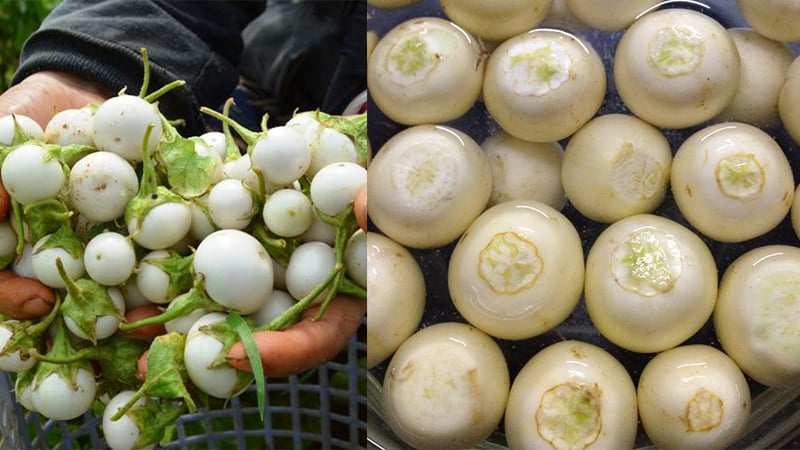Are Pickled Green Chilies Safe to Eat?
Let’s first understand the green chili pepper:
In traditional Chinese medicine, green chili peppers are considered sweet and cold in nature. They are believed to have medicinal properties such as blood circulation improvement, anti-inflammatory effects, pain relief, and digestive aid. They are also said to treat edema, remove abdominal masses, and help with cough and tuberculosis.
In Chinese medicine, the fruit of the chili plant is called di zi or jia zi, and ai qa in some dialects.
In common language, it is also known as ca ghep, ca phao, or ca muoi.
The scientific name of the green chili pepper is Solanum torum. It is a small plant with slightly lobed leaves and spines. The flowers are white, and the fruits turn from white to yellow when ripe. All parts of the plant are usable for medicinal purposes.

Green Chili Peppers
Green chili peppers are commonly used to treat lower back pain, injuries from falls, stomach aches, toothaches, amenorrhea, and chronic cough. A decoction of the roots, typically using 10-15g, is the preferred method of consumption for medicinal purposes.
Nutritionally, 100g of green chili peppers provide 1.5g of protein (including essential amino acids), 12mg of calcium, 0.7mg of iron, 18mg of magnesium, 16mg of phosphorus, 22.1g of potassium, and 0.3mg of zinc. They also contain trace amounts of copper and selenium, which are valuable microminerals.
Various vitamins are present, including provitamin A, vitamin C (3mg/100g), and B-complex vitamins such as B1, B2, and niacin. However, the hairy seeds inside the chili peppers may cause coughing, although there are no published studies confirming this. While the amount of sitosterol is negligible, green chili peppers do contain the toxic compound solanine. Unripe chilies tend to have higher levels of solanine than ripe ones.
Pickled green chili peppers are a result of fermentation, a process that introduces beneficial bacteria. These bacteria help break down hard-to-digest foods and natural sugars, aiding the digestive process.
They also enhance our appetite: Certain compounds in pickled chilies stimulate our taste buds, making food more palatable. Additionally, they provide dietary fiber, which prevents constipation and its associated complications, such as hemorrhoids.
However, consuming pickled green chili peppers also has some drawbacks for your health:
Green chili peppers contain solanine, a toxic compound. Pickled green chilies that are still fresh (not fully fermented) have higher levels of solanine compared to fully sour ones. However, the amount of solanine is significantly reduced during the pickling process when the chilies are soaked in brine.
Potential Increased Risk of Stomach Cancer: Highly salted pickled foods have been associated with an increased risk of stomach cancer. A study comparing two groups of people found that those who consumed larger quantities of salted pickled foods (such as pickled chilies and cucumbers) had a significantly higher incidence of stomach cancer.
Hypertension Risk: Excessive consumption of salted pickled foods leads to a higher intake of sodium, which can increase the risk of hypertension and other health issues.
In conclusion, while pickled green chili peppers offer some health benefits, they also have negative side effects. To minimize these adverse effects, it is advisable to consume them in moderation, and in some cases, individuals with certain health conditions may need to avoid them altogether.
Who Should Avoid Eating Pickled Green Chilies?
While pickled green chilies are a beloved condiment for many, certain individuals should limit or avoid consuming them due to potential health concerns. These include:
People with Gastric Ulcers or Gastroenteritis: Pickled chilies often contain spices like chili, salt, and fermentation products that can irritate the stomach. Therefore, those with a history of gastric ulcers or gastroenteritis should exercise caution when consuming them.
Individuals with Cardiovascular or Renal Diseases: The high salt content in pickled chilies is a concern for people with heart disease, hypertension, or kidney and liver diseases. The salt and spices can exacerbate these conditions, potentially leading to serious complications.
Those with Digestive Disorders: Pickled foods, especially freshly pickled chilies, may not completely eliminate disease-causing microorganisms. Therefore, consuming them can worsen digestive disorders.
Pregnant Women: During pregnancy, a woman’s digestive system becomes more sensitive, and pickled chilies can trigger feelings of fullness and nausea. Additionally, the safety of additives and preservatives in pickled foods for pregnant women and their unborn babies is uncertain, so it is best to avoid them.
Children: Children’s digestive systems are not yet fully developed, so it is advisable to refrain from giving them pickled or fermented foods that may be unhygienic.
Furthermore, people who are ill should avoid eating pickled green chilies due to the presence of solanine, a toxic compound that can be harmful to those with compromised health.
How to Consume Green Chili Peppers Safely:
To enjoy the health benefits of green chili peppers, experts recommend the following:
Consume chilies in season: Enjoy them when they are naturally available and at their freshest.
Avoid eating raw or freshly pickled chilies: Opt for fully fermented sour chilies instead.
Practice moderation: Do not consume excessive amounts of pickled chilies.
Avoid chilies with signs of spoilage: Do not eat chilies if they exhibit signs of mold or a white scum.
Maintain a balanced diet: Enjoy chilies as part of a varied and nutritious diet.



































